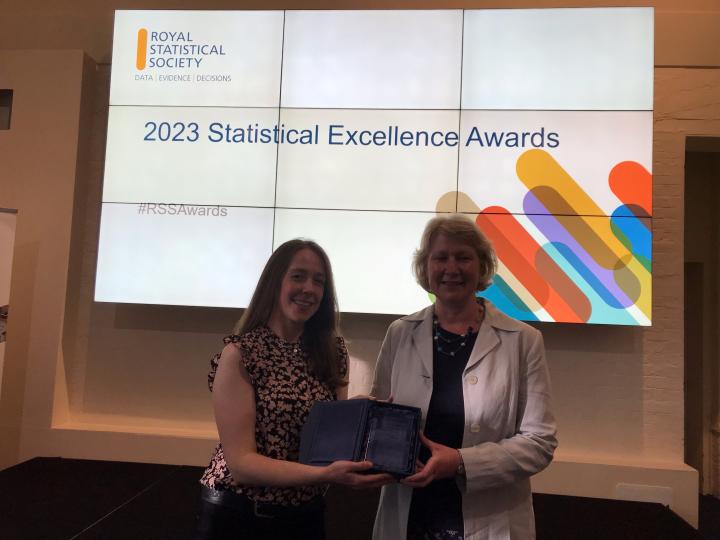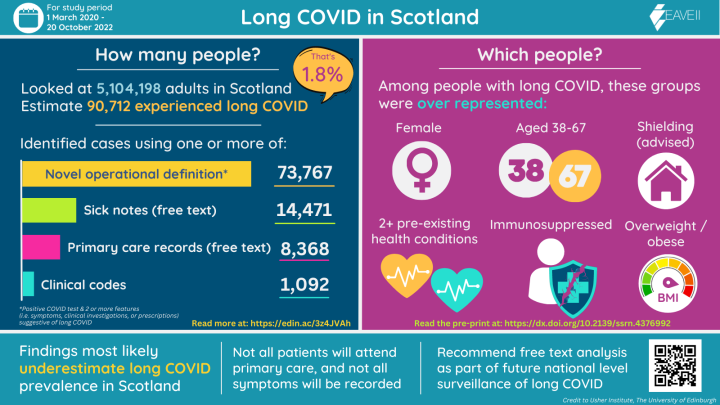Long COVID project recognised for statistical excellence
The Long COVID project was crowned joint winners of the Royal Statistical Society's Florence Nightingale Award for Excellence in Healthcare Data Analytics 2023
Last night, the work of the Long COVID project was celebrated at the Royal Statistical Society's (RSS) 2023 Statistical Excellence Awards Ceremony, where the team were crowned joint winners of the Florence Nightingale Award for Excellence in Healthcare Data Analytics.
The Florence Nightingale award recognises people or organisations working in applied healthcare data analytics, who have made exceptional contributions towards delivering better healthcare outcomes for patients or services in the UK. This may include anything from improving waiting times and treatments, or optimising healthcare pathways.
Dr Karen Jeffrey, who received the award on behalf of her team said:
We're honoured that the Royal Statistical Society and the Health Foundation have selected our team's research into long COVID for this award. The research benefitted from the expertise of many individuals, including our patient and public team members, analysts, clinicians, public health specialists and policy experts. We're delighted to receive recognition from such esteemed organisations, and we hope that the work will continue to inform service provision and support for long COVID patients.

What is the Long COVID project?
Long COVID is a sub-project of the EAVE II study, which recently won the Royal Society of Edinburgh's Mary Somerville Medal for exceptional achievements in research teamwork and collaborations. Whilst EAVE II focused on using patient data to track the effects of the COVID-19 pandemic in near real-time using the EAVE Surveillance platform, Long COVID is working towards creating a tool that will help predict who is most at risk of developing long COVID following a SARS-CoV-2 infection.
Find out more about the Long COVID project
Read more about EAVE II winning the Mary Somerville Medal
What did they find?

By analysing both the clinical codes and free text stored in electronic health records, the long COVID team found that:
- At least 1 in 50 people living in Scotland, or 1.8% of the population, have or had experienced long COVID during the study period
- Long COVID clinical codes are underused by GPs, with the majority of long COVID cases being identified in the written free text notes.
These results are preliminary and are in the process of being peer-reviewed and formally published in an academic journal.
Jeffrey, K; Woolford, L; Maini, R; Daines, L; et. al.
The Lancet (pre-print)
Published online on: 8 March 2023
Available online at: https://dx.doi.org/10.2139/ssrn.4376992
Read the supplementary materials
Download the infographics (PDF)
These infographics were created by EAVE II Communications & Engagement Officer, Gabriella Linning (Usher Institute, The University of Edinburgh)
Find out more about the project's contributions to the long COVID inquiry
The Florence Nightingale Award
The Florence Nightingale Award celebrates practitioners who have informed innovative and substancial changes that improve patient care (primary, secondary, tertiary or social) in a UK healthcare system. Here, practitioners can include UK organisations and groups that provide free health services at the point of care, or people or studies who collaborate with such groups.
Widely remembered for her work as a nurse in the Crimean War, Florence Nightingale was also a renowned statistician, becoming the first female fellow of the RSS in 1858. In fact, her investigative statistical work and impressive use of data vsiualisation revolutionised the nursing profession.
Find out more about the Florence Nightingal Award for Excellence in healthcare data analytics
Joint winners
The Long COVID project won this award alongside the Covid-SMART rapid antigen community testing evaluations team, who established the system that enabled Liverpool to offer the world’s first large scale testing pilot for voluntary use of lateral flow tests.

